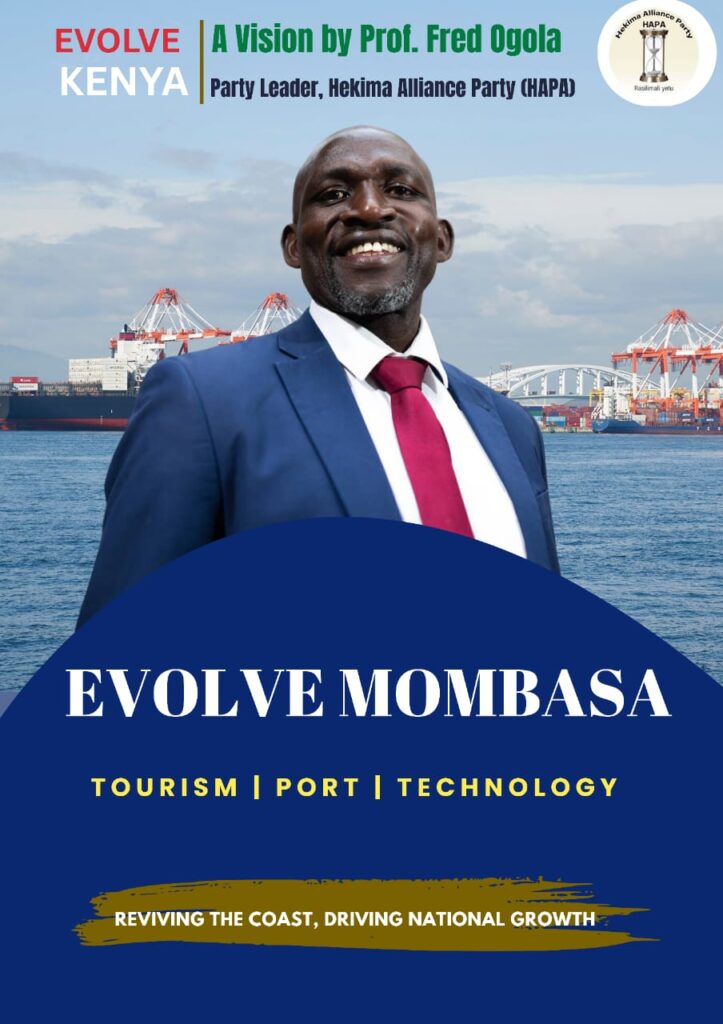In this feature, Professor Fred Ogola, the Hekima Presidential Aspirant, challenges Kenya’s leadership narrative from the shoreline. He argues that Kenya’s next revolution will begin where the waves meet the land, with justice for the Coast as the first step toward a fairer nation.

When Professor Fred Ogola talks about the Coast, he doesn’t sound like a politician chasing applause. He speaks like a man carrying history, the kind that doesn’t fade with time, only deepens with every unfulfilled promise.
Now, the Hekima Presidential Aspirant and self-described Crusader for the Coast has broken his silence with a powerful message: the Kenyan Coast is under siege, not from foreign forces, but from the state’s failure to deliver justice and inclusion.
“Land in the Coast has never just been soil; it’s identity, heritage, memory,” Ogola says. “To play politics with it is to reopen the deepest wounds of a people who’ve been told, time and again, that justice is coming , only for it to be postponed indefinitely.”
A Reform That Isn’t a Reform
At the heart of Ogola’s criticism is President William Ruto’s new land law, a policy the administration celebrates as reform but which Ogola calls “a remix of dispossession.”
To him, the legislation repackages old injustices in modern language, a bureaucratic replay of the land thefts that have scarred the region since independence.
“It’s like watching someone tear down the only bridge we had to fairness,” he says, “and then handing us the rubble as compensation.”
The Coast, historically exploited for its land and labor, has long been promised redress. Yet, as Ogola notes, each reform effort seems to protect power more than it empowers people.
The Politics of Exclusion
Ogola doesn’t mince words when it comes to political marginalization. He accuses the Ruto regime of perfecting the art of punishing dissent by omission, sidelining regions that don’t sing in tune with State House’s political rhythm.
“The Coast has been left out of key political conversations, critical appointments, and even the economic vision that’s supposed to unite the country,” Ogola asserts. “It’s as if loyalty to the State now requires silence about its failures.”
He frames silence not as peace, but as surrender, a dangerous trade-off that keeps the Coast voiceless in national decision-making.
“Let’s be clear,” he adds, “silence is not neutrality; it’s surrender.”
A Postcard of Potential, Still Waiting for Investment
Ogola’s frustration rests on a truth every coastal resident knows: the region remains rich in promise but poor in progress.
Despite its beauty, culture, and resources, the Coast lags behind in nearly every economic indicator. Tourism, once its lifeline is declining. Infrastructure remains underdeveloped. Investors fly over it on their way to Nairobi or Eldoret.
“The Coast remains a postcard of potential,” Ogola says, “beautiful, rich in resources, brimming with youth but neglected like an old port whose ships stopped coming.”
He paints a striking contrast: a region that fuels Kenya’s tourism brand but gains little from its profits; that anchors global trade but remains marginalized in its own nation’s development story.
Not Bitterness, But Belief
Ogola insists his fight is not personal, it’s philosophical and moral.
“I speak for the Coast because someone has to,” he says. “Not out of bitterness, but belief, belief that this region can stand tall again, with dignity and opportunity for all who call it home.”
You Also Missed American Tour: https://safinews.co.ke/his-presence-in-new-yorks-mayoral-conversation-is-conventional-but-deeply-symbolic/
His vision for a Coastal Renaissance, under the banner of the Hekima Movement, is rooted in decentralization, fairness, and the idea that every region from Mombasa to Marsabit deserves equal dignity in development.
The “Coastal Crusader,” as he now calls himself, blends intellectual depth with populist clarity, an economist fluent in both data and discontent.
From Silence to Storm: A New Coastal Awakening
Ogola’s message has begun to ripple through social and political circles. Among younger coastal voters, his blunt honesty has struck a chord. Many see him as the first national figure in years to speak plainly about systemic neglect.
He’s tapped into a growing realization: that the Coast’s struggles aren’t just about land or tourism, but about recognition, the right to be seen, heard, and valued.
“Until every young man in Likoni, every woman in Lamu, and every fisherman in Kilifi feels seen, heard, and valued,” Ogola says, “this fight is far from over.”
The Crusade Continues
In Kenya’s noisy political arena, where alliances shift faster than tides, Fred Ogola’s consistency stands out. He speaks less like a tactician and more like a teacher, one who believes that truth is the beginning of justice, even when it stings.
“The Coast doesn’t need sympathy,” he concludes. “It needs justice. And justice, my friends, begins with truth, even when it’s uncomfortable.”
As Kenya edges toward another election cycle, Ogola’s crusade could redefine the political current, one wave of honesty at a time.


Congratulations bro, you are doing well. We wish you well.
This eloquently captures the reality of the Coast Region. Let’s give this the energy it needs
Your article helped me a lot, is there any more related content? Thanks!
**herpafend**
Herpafend is a natural wellness formula developed for individuals experiencing symptoms related to the herpes simplex virus. It is designed to help reduce the intensity and frequency of flare-ups while supporting the bodys immune defenses.
Thank you for your sharing. I am worried that I lack creative ideas. It is your article that makes me full of hope. Thank you. But, I have a question, can you help me?